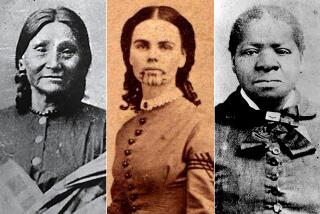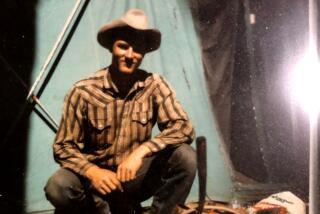Tamsen Donner is a part of her family now
Last year, I won the lottery. After 36 years of writing about Tamsen Donner and the Donner Party, I sold two books on her: a memoir, “Searching for Tamsen Donner,” and a novel, “Impatient With Desire.”
This summer, I set up gigs in Truckee, Calif., and Reno, as well as at the Emigrant Museum at California’s Donner Pass, to read “Searching for Tamsen Donner” in the heart of Donner Party country. The Emigrant Museum, in a state park, was a particular challenge. If you want to hold an “event” in a California state park -- a wedding, a rock concert, a reading -- there is a 20-page, one-size-fits-all application. You have to write a narrative of purpose; list your medical, security, traffic, concession and sanitation plans; send the processing fee; get a mandatory $1 million rider to your insurance policy; and promise 10% of any books sold.
Retail or wholesale, I wondered.
It was retail.
Why go to all that trouble? Sure, I thought I’d sell books, but for the same effort, I could have hustled them a lot closer to home.
“This means a lot to me,” I said to my husband on the 10-hour drive.
“I know,” he said.
I really didn’t think about why it was important. I just knew I wanted to read there, where bodies and souls -- especially Tamsen Donner’s -- were tested in inconceivable ways.
“It’ll be a hoot,” I kept saying, because that seemed likely, although I deeply hoped it would be more than that. There was definitely a carnival aspect to my “event,” which involved reading every hour on the hour from 10 a.m. to 4 p.m. The plan was to set a borrowed picnic table, umbrella and a dozen lawn chairs on a concrete patch next to the museum parking lot, with my husband and brother-in-law barking for me.
Then my daughter, seven months pregnant, and her husband decided to come and help bark too. My other daughters started talking about it. Their lives are busy, so I tried neither to encourage nor discourage them. Eventually, four daughters decided to join us, as well as four grandchildren, ages 7, 5, 2 and 1 -- the carnival aspect moving toward zoo. The fifth daughter, unable to rearrange a job commitment, was full of regret. “I just know I’ll miss something,” she said more than once.
I added to the agenda a seven-mile hike -- a retracing of a walk Tamsen Donner took twice -- almost as an afterthought.
The Donner Party, delayed and weakened by a disastrous “shortcut,” left Truckee Meadows -- now Reno -- in sections. Twenty-one people made it to Alder Creek, a small clearing in the Sierra Nevada, before early snows trapped them from November 1846 to March 1847. The 60 other members of the party made it seven miles farther west, to Truckee Lake (now Donner Lake).
Roughly half the party survived, half perished.
There was some communication and traffic between the two campsites, teamsters from Alder Creek going back and forth.
Tamsen Donner made this walk two times, one of them round trip.
The first time was in mid-March 1847, when she learned that rescuers had abandoned her three youngest children at the lake camp. She hurried through snow, fear in her heart. After sending the children out with two newly arrived rescuers, she walked back to Alder Creek to her dying husband.
The second time was in late March or early April, after her husband died. “She arrived one midnight,” Lewis Keseberg -- the only person still there -- told her daughter years later. “She had laid her husband out, and hurried away . . . over the snow alone to my cabin. She seemed very cold and her clothes were like ice. I think she had got in the creek in coming. She kept saying, ‘My children! . . . I am bound to go to my children.’ . . . She finally lay down and I spread a featherbed and some blankets over her. In the morning she was dead.”
In 1977, our family spent a summer retracing the Donner Trail. On that trip, we tried to walk the seven miles between the camps. The weather was ideal, the mountainside green and beautiful, but the walk was hard and I quickly understood how this area could be a labyrinth. Someday, I thought, I want to come back and try again.
Now 32 years later, that someday had arrived.
We got off at 8 a.m. with our water bottles and backpacks: husband, four daughters, four grandchildren, my brother-in-law and sister-in-law who were Truckee natives, my college-age niece and me.
Nobody knows -- or has ever known -- the path Tamsen Donner took. The land has been completely altered by development: highways, houses, a golf course, a reservoir, a school, stores. But when engineers build highways, they follow the path of least resistance. Most likely, Tamsen and the others would have done so also, taking a route that today follows parts of Highway 89 South and Highway 80 West. I drove that route, and it clocked at 6.8 miles.
We started at the Alder Creek Donner campsite, roughly following Alder Creek. It was hot, but not unpleasantly so, a beautiful day on a meandering trail. We forded two small streams. I fell into a 2-foot-deep hole, scrambling back out again without injury. Altogether, we hiked three, four, maybe more miles.
Most of us weren’t acclimated to the almost 6,000-foot altitude, and when leg muscles started wobbling, a few hiked ahead to a car we’d stowed. Several of us intended to keep following the creek, but abandoned our plan when it became clear that the trail ascended straight up a mountain.
Tamsen Donner would never have taken that route. There didn’t seem much point in our taking it. It wasn’t a Sierra Club outing.
So we joined the others climbing a precipitous hill to the car.
I wasn’t disappointed, nor did I feel I’d failed. I went to the Donner Lake campsites and walked around where the three shelters had been. Then I returned to Alder Creek, where the Donners had been trapped for nearly five months.
Alder Creek is a serene spot, a pretty meadow with waving grass, majestic pine trees. Nine people died there, including George Donner.
In 1977, I stayed all night by myself -- filled with fear -- at the base of the tree where it was believed Tamsen Donner’s shelter had been. I gave up smoking there.
In 1996, my children badgered me into attending the Donner Party Sesquicentennial, where I milled around in this meadow with several hundred descendants, and went back to writing about Tamsen Donner.
Now 13 years later, I again was there. Alder Creek is more than a historic site or a cemetery. You don’t have to be religious to believe that certain spots are sacred, hallowed by suffering, death and bravery.
I’ve spent decades immersed in the story of Tamsen Donner and the Donner Party, and still my imagination fails me. By the time they were stopped by snow, they had already achieved Herculean feats.
The pioneers often walked alongside their covered wagons, many of them traversing the country basically on foot. They forded countless streams, dragged wagons over impossible hills, lifting them with ropes, brute strength and determination. The Donner Party hacked out a road yard by yard through the Wasatch Mountains. Even before being trapped in the Sierras, they were on short rations, and then many survived for months, eating boiled oxen hides, crumbled bone bits, shoelaces. The cannibalism to which some turned was a natural progression in diminishing resources. Their physical and mental strength boggles the mind.
Think of Tamsen Donner in an underground yurt with her husband and her children starving. Some of the party, physically depleted, lay down and died. But Tamsen kept on. That is the great triumph and gift the overland pioneers gave us: keeping on.
I stood in the meadow at Alder Creek, mountains in the distance, a staggeringly beautiful vista, and marveled again at Tamsen Donner’s resilience and will. I felt comfortable. At home. This place was at peace and so, after numerous stops and starts, was I.
Pilgrimages don’t have to be perfect or transcendent to be fulfilling.
It wasn’t the readings at the Emigrant Museum, although they were meaningful to me.
It wasn’t the hike, Tamsen’s walk, although I’m glad we tried it.
No, for me, it was everything that happened on the periphery: grandchildren running around, my kids telling their kids Donner party stories, laughter, jokes, good food, junk food -- in short, a low-key, quiet celebration. After almost four decades of writing about Tamsen Donner, I was the author of two books about her. Our wanting to go back to Donner Pass, my family and I, was an acknowledgement of a goal reached, not quickly, not perfectly, but as best I could. As best we could. Through all my striving to honor Tamsen Donner, my family had sustained me. Those books were something we shared.
I think we all sensed this. We had traveled the long and winding road of trying to balance family and work, so quickly covered in retrospect. Once, I had yearned for interior and exterior space so I could write and, finding the former difficult and the latter impossible, I made Tamsen Donner a part of the family, taking my children every place she had been. They even named our dog after her. In the odd, unexpected ways that life plays out, going back to Donner Pass turned out to be both a writer’s, and a family’s, milestone.
Burton is the author of “Searching for Tamsen Donner” and the forthcoming “Impatient With Desire.”
More to Read
The biggest entertainment stories
Get our big stories about Hollywood, film, television, music, arts, culture and more right in your inbox as soon as they publish.
You may occasionally receive promotional content from the Los Angeles Times.










